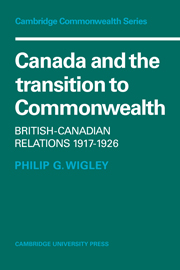Book contents
- Frontmatter
- Contents
- Abbreviations
- Preface
- Introduction
- 1 The threshold of responsibility, 1900–1916
- 2 New departures, 1917–1918
- 3 The settlement of peace, 1919
- 4 Unity and equality, 1919–1921
- 5 The centre cannot hold
- 6 Canadian diplomacy and Imperial diplomacy: 1923
- 7 From Lausanne to Locarno
- 8 The 1926 Imperial Conference: equality defined
- Conclusion
- Bibliography
- Index
5 - The centre cannot hold
Published online by Cambridge University Press: 26 March 2010
- Frontmatter
- Contents
- Abbreviations
- Preface
- Introduction
- 1 The threshold of responsibility, 1900–1916
- 2 New departures, 1917–1918
- 3 The settlement of peace, 1919
- 4 Unity and equality, 1919–1921
- 5 The centre cannot hold
- 6 Canadian diplomacy and Imperial diplomacy: 1923
- 7 From Lausanne to Locarno
- 8 The 1926 Imperial Conference: equality defined
- Conclusion
- Bibliography
- Index
Summary
The 1921 Imperial Conference closed with the British and dominion delegations restored once again to a unity of view on the empire's foreign policy, in spite of the strains of their vigorous disagreements over the future of the Anglo-Japanese alliance. Legal sharp practice and tactical compromise at the conference itself, together with the timely American appeal for disarmament talks at Washington, combined to give the various parties to the debate a shared hope that the alliance might be translated into a less exclusive Pacific entente to include the United States, and the British foreign secretary set out at once to pursue this new imperial policy with the idea of convening a special international conference in London. However, when Curzon quickly discovered that the American government would not consider any decisions about a Pacific agreement in advance of their own Washington Conference, he was obliged to leave the pace of further negotiations in their hands. This deference to American wishes, while essential as an expression of British goodwill, was nonetheless unfortunate as far as the empire's own conduct of foreign affairs was concerned, for it meant that no definite arrangements about the dominions' association with the Washington Conference were made before the overseas ministers took their leave from London. For his part Curzon assumed that a British delegation would alone represent the empire, and it was not until Lloyd George made his own independent decision that the dominions were invited to take part in the conference.
- Type
- Chapter
- Information
- Canada and the Transition to CommonwealthBritish-Canadian Relations 1917–1926, pp. 142 - 172Publisher: Cambridge University PressPrint publication year: 1977

